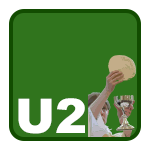I plan to do these weekly/bi-weekly devotionals using U2 songs as we lead up to the May 16th U2Charist. For this first week, we’re using the song Miracle Drug, the second track on U2’s recent (2004) album, How to Dismantle an Atomic Bomb. If you don’t already have the CD or song, here are two electronic outlets. Through iTunes, you can buy and download the track through the iTunes Store. Or you can order the full CD through Amazon.
Miracle Drug
When U2 came to Chicago in May 2005 on the Vertigo Tour, Bono introduced Miracle Drug by telling the story of how U2 fell in love with Chicago when they played in small bars 25 years ago. But Bono avoided resting in the nostalgia:
“We don’t really look back that much in our music. We don’t look at the past. The best bits of the past, we try to bring with us. There are songs – songs like Pride (in the Name of Love), songs like Sunday Bloody Sunday, songs like Where the Streets Have No Name. They’re the best bits of the past and we’ll take that with us. Because we’re interested, and we’re excited and we have faith in the future. That’s where we’re headed. So for a city of the future, this is our music. This is our … the thing that we’re strung out on. This is our drug. Miracle Drug.”
We all have these crutches that carry us into the future. Our families, our friends, our sometimes simple hope — we all have these touchstones that tell us who we are and why we work to change the world while we’re in it.
Miracle Drug is often lifted up as a “medical care anthem.” And indeed, it works for that. The bridge in the song has a surreal mixture of three voices singing different lyrics all at the same time.
Beneath the noise
Below the din
I hear a voice
It’s whispering
In science and in medicine
“I was a stranger
You took me in”
At the same time, “God I need …” and “Oh, yeah, ohhhhhhhh, yeaaaahhhhh” are layered on top of the soft, steady lyrics. Researchers, doctors, nurses, and all caretakers know these words in their hearts — it’s probably one of the most accurate voicings of their vocations. Their medical ministry reflects the care and persistence others have shown them in their lives. Even though Jesus didn’t mention that type of care in Matthew 25, it’s still that same hospitality that the doctors and nurses share.
But this song reflects a wider Christian truth as well. It acknowledges God’s ongoing revelation to the world. God didn’t stop speaking once the books of the Bible were set. Through the small miracles of medical breakthroughs to the bending of the long arc of history towards justice — Christians correctly pray for God’s knowledge to be ours. We don’t want to have to learn about God’s knowledge through narratives and recountings like we do in school and sermons. Such descriptions are imperfect. We want our knowledge to literally be God’s knowledge – with no intermediary.
I want to trip inside your head
Spend the day there …
To hear the things you haven’t said
And see what you might seeI want to hear you when you call
Do you feel anything at all?
I want to see your thoughts take shape
And walk right out
H. Richard Niebuhr, a 20th century American theologian, wrote in The Meaning of Revelation, about God’s action and the way we relate to it:
We acknowledge revelation by no third person proposition, such as that there is a God, but only in the direct confession of the heart, “Thou art my God.” We can state the convincement given in the revelatory moment only in a prayer saying, “Our Father.” Revelation as the self-disclosure of the infinite person is realized in us only through the faith which is a personal act of commitment, of confidence and trust, not a belief about the nature of things. (p81)
We don’t have to be able to describe God’s thoughts or order for a perfect world in order to work toward it. We should want to, but we don’t have to be able to.
What is your miracle drug? How will the world be better by the time you leave? If you could see one thing through God’s eyes, what would it be?
Other Resources
Each week I’ll also include other resources. These will be videos such as excerpts for Bono’s speeches, documentaries led by Bono on the MDGs, or music videos from U2 and other artists.
This week, check out the video from Bono’s speech (sermon!) at the National Prayer Breakfast on February 2, 2006.
[youtube=http://www.youtube.com/watch?v=gUdrYDk8rVA]









Speak Your Mind
You must be logged in to post a comment.